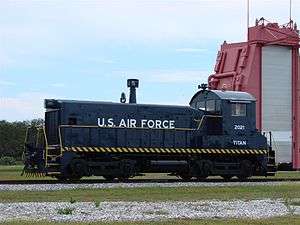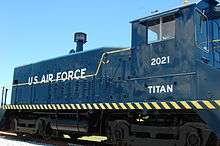EMD SW8
An EMD SW8 is a diesel shunting/switching locomotive manufactured by General Motors Electro-Motive Division and General Motors Diesel between September 1950 and February 1954. Power is supplied by an EMD 567B 8-cylinder engine, for a total of 800 hp (600 kW). A total of 309 of this model were built for United States railroads and 65 for Canadian railroads. Starting in October 1953 a number of SW8s were built with either the 567BC or 567C engine, they are noted in the roster below.
| EMD SW8 | |||||||||||||||||||||
|---|---|---|---|---|---|---|---|---|---|---|---|---|---|---|---|---|---|---|---|---|---|
 | |||||||||||||||||||||
| |||||||||||||||||||||
| |||||||||||||||||||||
| |||||||||||||||||||||
| |||||||||||||||||||||
US Army SW8s
The US Army ordered 41 SW8s, numbered 2000–2040, for service in Korea during the Korean War. These were shipped in the spring of 1951.
After the Korean War, many US Army-owned SW8s were turned over to the South Korean government while others were retained by the Army and assigned to various Army posts, depots and ammunition plants. Most were retired around 1990 and replaced in service by rebuilt geeps, such as GP10s from VMV in Paducah, KY, and other rebuilders.
Of all of the locomotives turned over to the Korean National Railroad, only one, KNR #2001, believed to be ex-USAX #2011, still exists. As of May 2011 it was stored in the back of a locomotive shed in the Korea Railroad Busan Rolling Stock Workshop, 125 Sincheon-ro, Busanjin-gu, Busan, Korea 614-765. Diesel Locomotive Team Leader Kim Hyun-Sik stated KORAIL is in talks with the city of Pusan to put the locomotive on display in the city as a part of Korea's heritage, as it is the oldest diesel locomotive in the country.
Two examples of these locomotives, ex-USAX #2019 and #2022, are preserved at the Heart of Dixie Railroad Museum in Alabama. After serving in Korea, #2019 was sent back to the manufacturer for reconditioning in 1953. #2022 was rebuilt in 1955. Both served in military bases in the United States until the early 1990s, finishing their careers at Fort Campbell, Ky. The Heart of Dixie Railroad Museum acquired them in 1995.[1]
Other models
In addition, 12 TR6 cow-calf paired sets were produced.
In May 1953, a single example of the SW8 was built with a hydraulic transmission as model DH2. This locomotive was displayed at a trade show in 1955, but no sales of the DH2 followed. The locomotive was rebuilt with a standard electrical transmission, and served EMD as plant switcher #105 until 1968.
The first TR6A, Southern Pacific 4600, later numbered 1100, is preserved at the Western Pacific Railroad Museum at Portola, California.
Original buyers

SW8
Locomotives built by Electro-Motive Division, USA
| Railroad | Quantity | Road numbers | Notes |
|---|---|---|---|
| Electro-Motive Division (plant) | Built as model DH-2 | ||
| Electro-Motive Division (demonstrator) | to Illinois Terminal Railroad 725 | ||
| to Georgia Northern Railway 801 | |||
| to Cuyahoga Valley Railway 855 | |||
| Aliquippa and Southern Railroad | Built with 567BC engines | ||
| Atlantic Coast Line Railroad | |||
| Bamberger Railroad | |||
| Boston and Maine Railroad | |||
| Canton Railroad | 42-43 were built with 567C engines | ||
| Cedar Rapids and Iowa City Railway ("Crandic") | Built with 567BC engines | ||
| Chicago and North Western Railway | |||
| Chicago, St. Paul, Minneapolis and Omaha Railway ("Omaha Road") | |||
| Chicago, Rock Island and Pacific Railroad | 836-838 were built with 567BC engines. 838 was acquired by Pfizer Incorporated in 1989 and then donated to the Danbury Railway Museum in 2002.[2] | ||
| Chicago, West Pullman and Southern Railroad | |||
| Cincinnati Union Terminal | |||
| Colorado and Wyoming Railway | |||
| Columbia Iron and Steel | |||
| Delaware, Lackawanna and Western Railroad | |||
| De Queen and Eastern Railroad | |||
| Detroit, Toledo and Ironton Railroad | |||
| Donora Southern Raileoad | |||
| Great Northern Railway | 98-99 to Burlington Northern. 101 was rebuilt from an NW1 | ||
| Lake Terminal Railroad | |||
| Lakeside and Marblehead Railroad | |||
| Lehigh Valley Railroad | 256-273 built with dynamic brakes. | ||
| Louisiana and North West Railroad | |||
| Ludington and Northern Railroad | |||
| Merchants Despatch Transportation | |||
| Monessen Southwestern Railway | |||
| New Orleans Union Passenger Terminal | Built with 567BC engines | ||
| New York Central Railroad | To Penn Central then Conrail 8602-8627 | ||
| New York Central Railroad (Chicago River and Indiana Railroad) | To Penn Central then Conrail 8600-8601 | ||
| New York, Chicago and St. Louis Railroad ("Nickel Plate Road") | |||
| North Louisiana and Gulf Railroad | Built with 567BC engines | ||
| Pittsburgh Coke and Chemical Company | |||
| Poplar Ridge Coal | |||
| Reserve Mining Company | |||
| Roscoe, Snyder and Pacific Railway | |||
| South Shore Railway | to Illinois Central Railroad 802 | ||
| Southern Pacific Company | All built with dynamic brakes; 4622-4623 built with 567BC engines | ||
| Southern Pacific (Texas and New Orleans Railroad) | |||
| Steelton and Highspire Railroad | |||
| Tennessee Coal, Iron and Railroad Company | |||
| Texas and Pacific Railway | |||
| Tremont and Gulf Railway | to Illinois Central Railroad 800 and 801 | ||
| Unity Railways | |||
| United States Army | All 41 served in the Korean War, including the 2019 and 2022 now at the Heart of Dixie Railroad Museum.[1] 2002 is on display at the Museum of Transportation in Kirkwood, Missouri.[3] | ||
| United States Steel | |||
| Wabash Railroad | |||
| Wheeling Steel | |||
| Wichita Falls and Southern Railroad | to Rock Island 839–840 | ||
| Woodward Iron Company | |||
| Total | 309 | ||
Locomotives built by General Motors Diesel, Canada
| Railroad | Quantity | Road numbers | Notes |
|---|---|---|---|
| Algoma Central Railway | |||
| Algoma Steel | |||
| Canada and Gulf Terminal Railway | |||
| Canadian National Railways | |||
| Canadian Pacific Railway | |||
| Dominion Foundries and Steel Company ("Dofasco") | |||
| Dominion Iron and Steel | |||
| Essex Terminal Railway | Essex Terminal 104 last SW8 built 2/54 | ||
| Steel Company of Canada | |||
| Wabash Railroad | Bought for use in Canada | ||
| Total | 65 | ||
TR6
| Railroad | Quantity A units | Quantity B units | Road numbers A units | Road numbers B units | Notes |
|---|---|---|---|---|---|
| Electro-Motive Division (demonstrator) | to Southern Pacific 4600 (A), 4700 (B) | ||||
| Oliver Iron Mining Company | |||||
| Southern Pacific Company | |||||
| Total | 12 | 12 | |||
References
![]()
- "From Korea to Alabama: Train engines still pulling duty". US Army 314th Public Affairs Operations Center. June 2012. Retrieved 2012-06-29.
- EMD SW-8 (1953) Pfizer 1 (Danbury Railway Museum)
- "Railway Equipment". The National Museum of Transportation. National Transport Museum Association. 2017. Retrieved June 10, 2018.
- Pinkepank, Jerry A. (1973). The Second Diesel Spotter's Guide. Milwaukee, Wisconsin: Kalmbach Publishing. ISBN 978-0-89024-026-7.
- EMD Product Reference Data Card dated January 1, 1959 has the 567BC and 567C engine data used in the as-built roster.
| Wikimedia Commons has media related to EMD SW8 locomotives. |